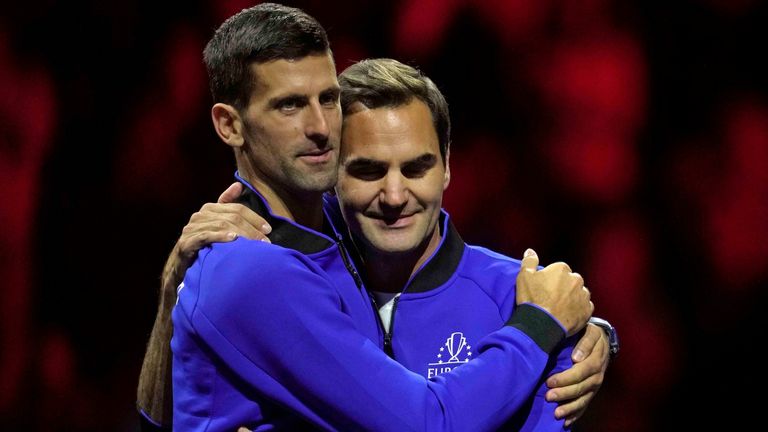In January 2008, Novak Djokovic etched his name into tennis history by claiming his first Grand Slam title at the Australian Open. This victory marked the beginning of a journey that would see him rise to become one of the greatest players of all time. However, this milestone also raised an inevitable question: was Roger Federer’s dominance of men’s tennis coming to an end? Djokovic, ever respectful and insightful, addressed the speculation with humility and foresight.
Here's ads banner inside a post
This is the story of a pivotal moment in tennis history and how it signaled the dawn of a new era while highlighting the enduring brilliance of Federer.
The Rise of Novak Djokovic: A New Contender Emerges
When Djokovic arrived at the 2008 Australian Open, he was already seen as a rising star. The Serbian had demonstrated exceptional skill and mental toughness in his previous seasons, but the Melbourne tournament marked a turning point. In the semi-finals, Djokovic faced Federer, a player who had become synonymous with dominance in the sport during the 2000s.
Djokovic’s straight-sets victory—7-5, 6-3, 7-6(5)—was a statement. For the first time since 2005, Federer failed to make the final of a Grand Slam, an event that had become almost routine for the Swiss Maestro. Djokovic followed up his breakthrough win with a clinical performance against Jo-Wilfried Tsonga in the final, claiming the Norman Brookes Challenge Cup and announcing himself as a new force in the men’s game.
Here's ads banner inside a post
Djokovic’s Response: Humility and Respect
Following his historic win, Djokovic faced inevitable questions about what his victory meant for Federer’s dominance. Would this result signal the end of Federer’s era atop men’s tennis? Djokovic’s response was both gracious and insightful.
“No, I don’t think so,” Djokovic said. “It’s not possible that only one tournament is changing the history. Of course, I mean, I played amazing tennis here, so I think I absolutely deserved to win, even against him in the semifinals. But he’s going to come back in a big style. We’re going to see a lot of him, of course, this year.”
In this statement, Djokovic displayed a respect for Federer’s legacy while confidently asserting his own right to compete at the highest level. His acknowledgment of Federer’s resilience was prophetic, as the Swiss star would go on to achieve further milestones.
Here's ads banner inside a post
The Federer Legacy: Resilience Amidst Rising Competition
By the time Djokovic emerged as a Grand Slam champion, Federer had already cemented his place in tennis history. Between 2003 and 2007, Federer won 12 of his 20 Grand Slam titles, including five consecutive Wimbledon and US Open crowns. His dominance was unparalleled, but as the 2000s progressed, new challengers like Djokovic and Rafael Nadal began to test his supremacy.
Despite setbacks in 2008, Federer demonstrated remarkable resilience. He reached all four Grand Slam finals in 2009, claiming his first and only French Open title to complete the career Grand Slam and adding a sixth Wimbledon crown. Federer’s triumphs continued into the 2010s, with victories at the Australian Open in 2010 and Wimbledon in 2012.
Even as he entered his thirties, Federer defied expectations. His remarkable 2017 season, which included his fifth Australian Open title and an eighth Wimbledon crown, was a testament to his enduring brilliance. Federer’s ability to adapt his game and compete at the highest level well into his late thirties remains one of the most extraordinary aspects of his career.
The New Era: Djokovic, Nadal, and Federer’s Legacy
Djokovic’s victory in 2008 was not just a personal triumph; it was a sign of the shifting tides in men’s tennis. Alongside Rafael Nadal, Djokovic began to challenge Federer’s dominance, ushering in an era defined by the legendary “Big Three.” Each player brought unique qualities to the game, captivating fans and elevating tennis to unprecedented heights.
Federer continued to win Grand Slam titles, but his share of dominance began to wane as Djokovic and Nadal carved their own legacies. Djokovic’s relentless pursuit of excellence saw him claim 24 Grand Slam titles (as of 2024), surpassing Federer’s tally and asserting himself as one of the greatest players in history.
Despite this, Federer’s influence on the sport remains unparalleled. His artistry, sportsmanship, and ability to inspire generations of players and fans have solidified his status as an icon of tennis.
Conclusion: A Defining Moment in Tennis History
Novak Djokovic’s 2008 Australian Open victory was more than a career breakthrough—it was a moment that symbolized the evolution of tennis. It marked the beginning of Djokovic’s rise to greatness while highlighting the enduring brilliance and resilience of Roger Federer.
Sixteen years later, Djokovic’s achievements have redefined the sport’s history, but his respect for Federer’s contributions remains evident. Federer, in turn, leaves behind a legacy that transcends records and titles, embodying the spirit of the game.
As tennis continues to evolve, the moments shared between legends like Federer, Djokovic, and Nadal will be remembered as some of the greatest chapters in the sport’s storied history.

